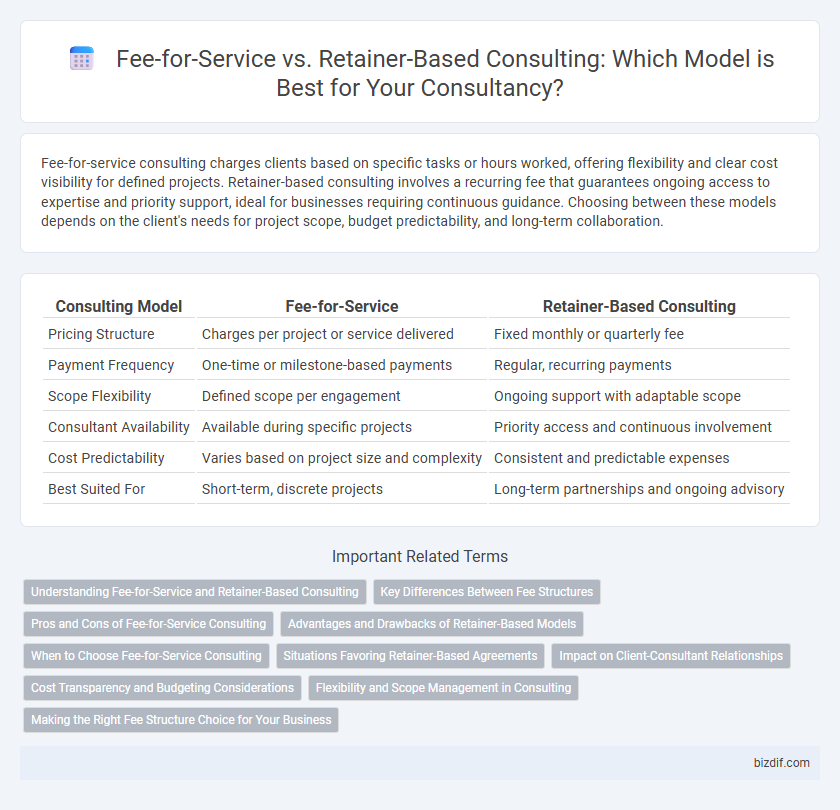Fee-for-service consulting charges clients based on specific tasks or hours worked, offering flexibility and clear cost visibility for defined projects. Retainer-based consulting involves a recurring fee that guarantees ongoing access to expertise and priority support, ideal for businesses requiring continuous guidance. Choosing between these models depends on the client's needs for project scope, budget predictability, and long-term collaboration.
Table of Comparison
| Consulting Model | Fee-for-Service | Retainer-Based Consulting |
|---|---|---|
| Pricing Structure | Charges per project or service delivered | Fixed monthly or quarterly fee |
| Payment Frequency | One-time or milestone-based payments | Regular, recurring payments |
| Scope Flexibility | Defined scope per engagement | Ongoing support with adaptable scope |
| Consultant Availability | Available during specific projects | Priority access and continuous involvement |
| Cost Predictability | Varies based on project size and complexity | Consistent and predictable expenses |
| Best Suited For | Short-term, discrete projects | Long-term partnerships and ongoing advisory |
Understanding Fee-for-Service and Retainer-Based Consulting
Fee-for-service consulting involves charging clients based on specific projects or deliverables, providing flexibility and clear cost expectations for each task. Retainer-based consulting requires clients to pay a fixed regular fee, ensuring ongoing access to expertise and continuous support. Understanding these models helps businesses choose between project-specific engagement and long-term strategic partnerships.
Key Differences Between Fee Structures
Fee-for-service consulting charges clients based on specific projects or tasks, offering flexibility and clear cost expectations for defined deliverables. Retainer-based consulting involves a fixed recurring fee, providing consistent access to consulting expertise and ongoing support over a set period. Key differences include payment predictability, client-consultant commitment duration, and the scope of services covered under each fee structure.
Pros and Cons of Fee-for-Service Consulting
Fee-for-service consulting offers clear transparency with clients paying only for specific services rendered, enabling flexible budgeting and project-based collaboration. This model encourages consultants to deliver measurable results efficiently but may lead to unpredictable income and limited client relationship depth. Fee-for-service consulting suits short-term engagements but can hinder long-term strategic planning and continuous support compared to retainer-based agreements.
Advantages and Drawbacks of Retainer-Based Models
Retainer-based consulting provides clients with continuous access to expert advice and predictable budgeting, fostering long-term strategic partnerships and proactive problem-solving. However, this model may lead to underutilization of paid hours, causing some clients to perceive limited value if their needs fluctuate. Consultants face challenges in balancing workload and maintaining flexibility, as steady revenue requires consistent commitment even during low-demand periods.
When to Choose Fee-for-Service Consulting
Fee-for-service consulting is ideal for businesses seeking targeted expertise on specific projects with clearly defined scopes and deliverables. This model provides flexibility and cost control, allowing clients to pay solely for discrete services without ongoing commitments. Organizations facing short-term challenges or requiring specialized solutions benefit most from fee-for-service arrangements.
Situations Favoring Retainer-Based Agreements
Retainer-based consulting agreements are ideal for businesses seeking ongoing strategic support and proactive problem-solving, ensuring continuous access to expert advice without transactional delays. Organizations with fluctuating needs or long-term projects benefit from consistent budget allocation and prioritized consultant availability under retainer contracts. This model fosters stronger client-consultant relationships, enabling deeper industry insights and tailored solutions that evolve with the business.
Impact on Client-Consultant Relationships
Fee-for-service consulting often leads to a transactional client-consultant relationship where engagements are project-specific and time-bound, emphasizing immediate deliverables and clear scope of work. Retainer-based consulting fosters ongoing collaboration, promoting deeper understanding of client needs and enabling proactive problem-solving that strengthens trust and long-term partnership. The choice between fee-for-service and retainer models significantly influences communication frequency, expectation alignment, and the overall strategic impact on the client's business growth.
Cost Transparency and Budgeting Considerations
Fee-for-service consulting offers precise cost transparency by charging clients based on specific tasks or hours worked, making it easier to budget for individual projects. Retainer-based consulting provides predictable monthly expenses, enhancing long-term budgeting stability but may obscure the exact allocation of funds to specific services. Firms must evaluate their project scope and cash flow to determine the optimal pricing model for cost control and financial planning.
Flexibility and Scope Management in Consulting
Fee-for-Service consulting offers high flexibility by allowing clients to pay only for specific services, making it ideal for well-defined, project-based engagements with limited scope changes. Retainer-Based consulting provides consistent access to expertise and smoother scope management by establishing ongoing relationships and predictable costs, which is beneficial for evolving or broad consulting needs. Balancing flexibility and scope control depends on the client's project complexity and adaptability requirements, influencing the choice between fee-for-service and retainer models.
Making the Right Fee Structure Choice for Your Business
Choosing between fee-for-service and retainer-based consulting depends on your business goals and cash flow stability. Fee-for-service suits projects with defined scopes and deliverables, offering clear cost control and flexibility, while retainer-based consulting ensures ongoing support and consistent expert access, ideal for long-term strategic partnerships. Evaluating your need for predictability versus project-specific outcomes is crucial for selecting a fee structure that maximizes value and aligns with your operational priorities.
Fee-for-Service vs Retainer-Based Consulting Infographic

 bizdif.com
bizdif.com